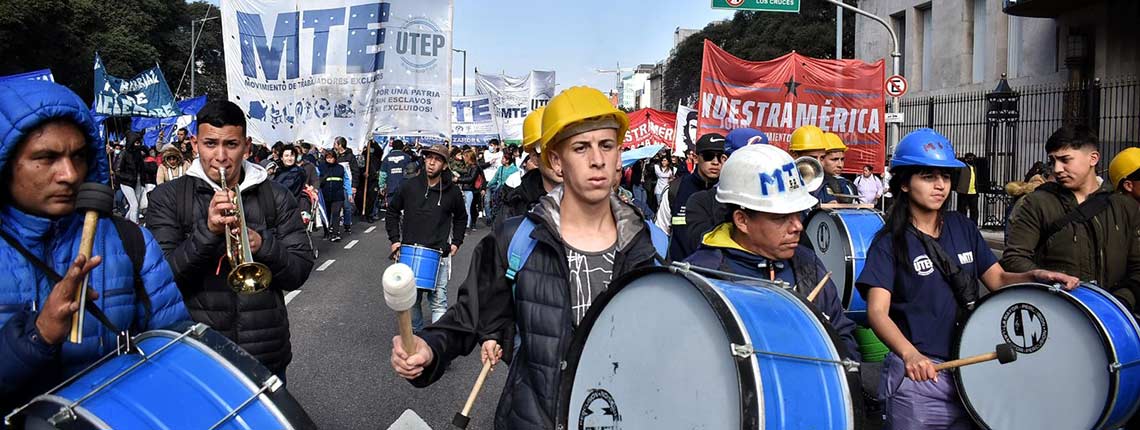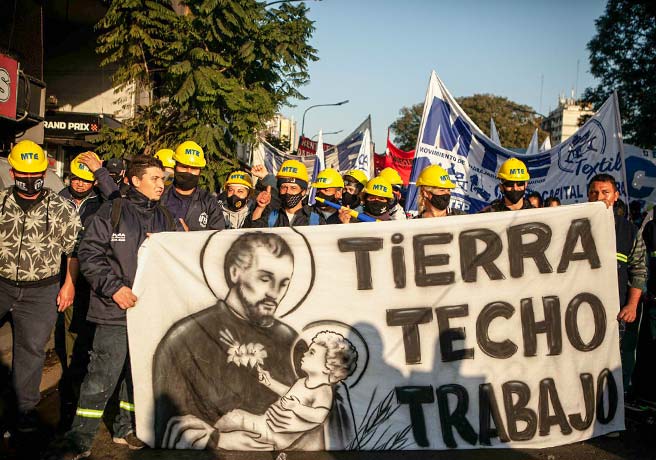
Cooperatives invite us to place human beings and their environment at the centre of the economy. The needs of an individual, but also of their family and community, guide the actions of these enterprises. This is essential for workers in informal employment, who represent 61% of the world's working population. Many have adopted Social and Solidarity Economy (SSE) organizational forms, particularly cooperatives, to work, produce and have political representation. This is especially the case where conditions do not favour their entry into the formal labour market.
However, there is a persistent and false belief that experiences in the informal and popular economy fail as a viable alternative to the current economic system through their perceived lack of productivity. Under that paradigm, increasing the productivity of such forms of organization of the economy would be their only path to formalization. On the International Day of Cooperatives, we want to question this statement.
We want to show how, through a workers’ cooperative association, the productivity of a company can improve. And we also want to go further and ask: Is productivity the only thing that matters in the economy? What other contributions can cooperatives make to the well-being of a community?
Beyond economic needs: a sense of social justice
Worker cooperatives can function as both an enterprise and a social organization. They serve as a platform to share resources, reduce costs and offer a more comprehensive array and quality of products and services; but cooperatives also allow for the management of individual and collective needs, to guarantee a place for the social and political involvement of people.
Popular economy cooperatives arise when their members, rejected by the formal labour market for various reasons, must create their own work to survive. That is why their main goal is revenue generation, to guarantee a livelihood and a decent lifestyle for their members. But the struggle for a decent lifestyle cannot only be reached by addressing economic needs, it needs to go beyond that.
Discrimination on the basis of class, sexual orientation or gender identity, ethnicity or migration status, among others, is an obstacle for many people trying to access the formal labour market. This is also the case of feminized identities that, being in charge of household care tasks, must give up hours of paid work. Cooperative action guarantees, in these cases, inclusion in the labour market and advocacy for the development of policies that integrate those outside of the system into the economy, taking equity and social justice into consideration.
Transforming waste management through collective action
The experience of the Movement of Excluded Workers (Movimiento de Trabajadores Excluidos or MTE) of Argentina, a member organization of the Union of Workers of the Popular Economy (UTEP), illustrates this clearly. This social organization, which brings together cooperatives and productive units from diverse fields, has carried out numerous initiatives to improve the quality of life of its members and their communities.

In the recycling field, the MTE managed to answer the needs of waste pickers or cartonerxs in Buenos Aires in an organized way. MTE negotiated a wide range of issues with the local authorities: from the provision of basic needs, like uniforms and personal protective equipment, to larger agreements – such as establishing that the cooperatives would provide collection services and manage the transportation and preparation of recyclable materials, guaranteeing them exclusive access to materials.
Thanks to this collective action, the working conditions of waste pickers and the income of their families improved. And even structural changes were introduced, such as a gradual transformation of waste management regulatory frameworks. This led to the recognition of waste pickers, their organizations and their working modality as an extensive and coordinated workforce and a key element of proper waste management in the city. Ultimately, access to infrastructure also improved the quality of the recycling service provided by these cooperatives.
Efficient responses to collective needs
We must also keep in mind the elemental, though often invisible, contribution that recycling cooperatives make in environmental terms. Research shows that, even considering the work of only one cooperative, The Dawn of Waste Pickers (El Amanecer de los Cartoneros) from Buenos Aires, the emission of more than 110 thousand tons of CO2 equivalent per year is avoided. This is due both to the substitution of virgin raw materials for recyclable materials and to the prevention of open burning through the integration of waste pickers into the formal system. Society benefits enormously from this work, which, if it had been channelled into the traditional waste management system by public or private companies would have had a negative environmental impact on communities.
Additionally, the experience of the MTE’s Children’s Recreation and Learning Centres shows us how, thanks to the decision-making capacity of workers and their link with the community, efficient responses can be found for collective needs. Ever since their creation, these centres have helped prevent child labour and reduced the gender wage gap: they allow children to stay at child-care facilities while their fathers and mothers work, and they offer an alternative for feminized workers in the popular economy to extend their hours of paid work.

These few examples show how improving working conditions and people’s well-being favour productivity (and not the other way around). As popular economy cooperatives play an integral role in society – merging economic, political and social aspects – there is a need for regulatory tax frameworks that respect how cooperatives operate and are adapted to their realities. At the same time, such frameworks should also promote the creation and development of cooperatives, in order to deepen their contributions to individual and collective well-being.
Worker cooperatives invite us to reject competition and embrace cooperation. Supporting each other and developing community networks can bring us closer to the standards of decent work, as understood in a broad sense, and encompass the complexity of the human being as a whole.
Top photo: Members of MTE hold a demonstration in Buenos Aires, Argentina. Credit: UTEP
Related Posts
-
Informal Economy Theme
-
Informal Economy Topic
-
Occupational group
-
Language
